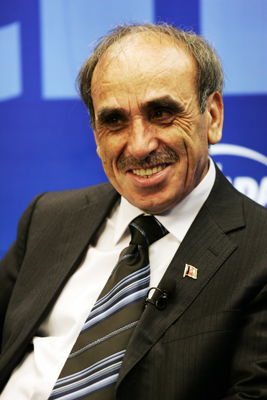Afghan envoy sees progress
Updated: 2011-09-10 08:23
By Mike Peters (China Daily)
|
|||||||||||
BEIJING - As the world looks back at Sept 11, 2001, Afghanistan's envoy to China says that while his country was transformed by that date, the 10th anniversary of the terrorist attacks is a time for Afghans to look forward.
The international response to Sept 11 "helped the people of Afghanistan to change their way of life, to work for a better life, to reconstruct the country and build national institutions", Ambassador Sultan Baheen told China Daily in an exclusive interview on Friday.
 |
| Sultan Baheen |
"This is a country that was once visited by many tourists, a country with very, very beautiful landscapes. This is a country of agriculture. And this is a country (with a) very bright history," he said, pointing to the example of the 13th-century Muslim poet, theologian and mystic Maulana Jalaluddin Balkhi Rumi - known in the English-speaking world simply as Rumi.
Rumi's poetry forms the basis of much classical Iranian and Afghan music, and in 2007 one US survey ranked him the most popular poet in the US.
"He produced 66,000 verses in his life," Baheen said with quiet awe. "You cannot compare him with any other poet. This is the example of Afghanistan. So with this brilliant history, with this hard work, and with this talent of Afghans, I think Afghanistan will be a much different place."
The ambassador sees his country's partnership with China as a key part of Afghanistan's stronger, more united future. China is the largest foreign investor in his country, thanks to joint-venture projects such as a large copper mine south of Kabul, agriculture infrastructure and road-building. In the latest deal, the government has chosen China's National Petroleum Corp (CNPC) as a preferred bidder for an oil field in northern Afghanistan, and hopes to reach a final deal by the middle of October.
"This is a joint venture with an Afghan company called Afghan Group," Baheen said. "Chinese investment has been very effective for job creation. I think that is good news for us in Afghanistan and for our Chinese relationship."
The contract will be the first international oil production deal signed by Kabul for several decades, Reuters reported. Baheen said the deal is an important step to help the ill-funded government cash in on untapped mineral deposits, estimated to be worth up to $3 trillion.
Moving forward, Baheen said President Hamid Karzai's government is pushing three primary goals.
"First, we should have a comprehensive regional strategy: Fight the roots of terrorism and end safe havens for terrorist groups outside Afghanistan. Second, help the Afghan people see the (economic) changes in their lives. Third, strengthen the cooperation among regional countries."
Improving cooperation with Pakistan is key, he said. "For a long, long time, we have noted that these terrorists are not limited to Afghanistan. Right now Pakistan is also a victim of terrorism," Baheen said.
As troops from the US and its allies pull out, Baheen said Afghanistan "welcomes the support and cooperation of the Chinese in all fields".
- China's inflation eases to 6.2% in August
- 11 dead in C China ferry sinking
- World took a stand after 9/11: Locke
- Birth defects still a challenge
- Ministry: China to further facilitate investment
- State Council demands spill probe
- Little role of NATO in anti-terrorism
- Internet major source of rumors: poll
Hot Topics
Libya conflict, Gaddafi, Oil spill, Palace Museum scandal, Inflation, Japan's new PM, Trapped miners, Mooncake tax, Weekly photos, Hurricane Irene
Editor's Picks

|

|

|

|

|

|







